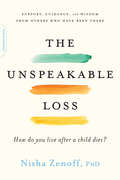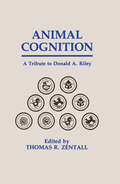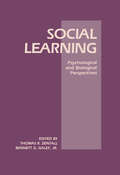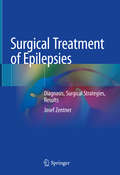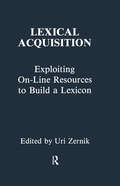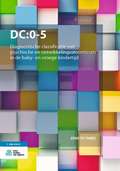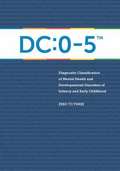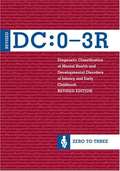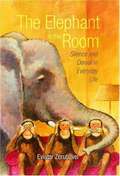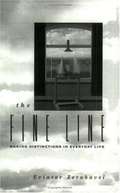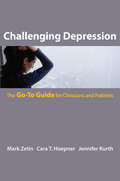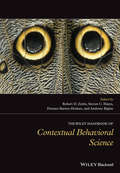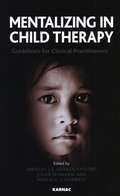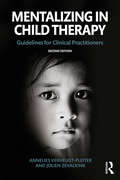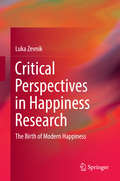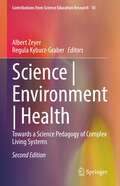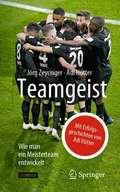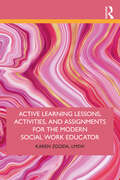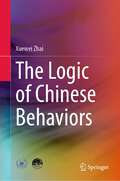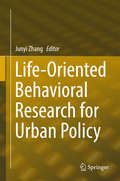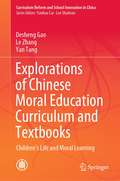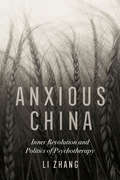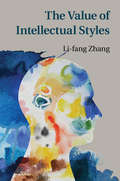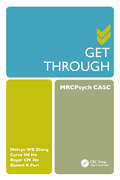- Table View
- List View
The Unspeakable Loss: How Do You Live After a Child Dies?
by Nisha ZenoffA guide to hope and healing after the death of a child, from a grief counselor and psychotherapist who has been there.Nisha Zenoff lost her son in a tragic accident when he was just seventeen years old. Now, with decades of experience as a grief counselor and psychotherapist, she offers support and guidance from her own journey and from others who have experienced the death of a child. The Unspeakable Loss helps those who mourn to face the urgent questions that accompany loss: "Will my tears ever stop?" "Who am I now without my child?" "How can I help my other children cope?" "I lost my only child, how do I live?" "Will my marriage survive?" "Will life ever feel worth living again?"No matter where you are in your grieving process, The Unspeakable Loss provides a space to mourn in your own way, and helps you understand how the death of a child affects siblings, other family members and friends, recognizing that we each grieve differently. And while there is no one prescription for healing, Zenoff provides tools to practice the important aspects of grieving that are easily forgotten--self-compassion and self-care.The Unspeakable Loss doesn't flinch from the reality or pain caused by the death of a child, yet ultimately it is a book about the choice to embrace life, love, and joy again. As Zenoff writes in the Preface: "Our relationships with our children do not end with their deaths. Our relationships change, they're transformed, but our children will always be with us."
Animal Cognition: A Tribute To Donald A. Riley (Comparative Cognition and Neuroscience Series)
by Thomas R. ZentallPrepared as a tribute to Donald A. Riley, the essays that appear here are representative of a research area that has loosely been classified as animal cognition -- a categorization that reflects a functionalist philosophy that was prevalent in Riley's laboratory and that many of his students absorbed. According to this philosophy, it is acceptable to hypothesize that an animal might engage in complex processing of information, as long as one can operationalize evidence for such a process and the hypothesis can be presented in the context of testable predictions that can differentiate it from other mechanisms. The contributions to this volume represent the three most important areas of research in animal cognition -- stimulus representation, memory processes, and perceptual processes -- although current research has considerably blurred these distinctions.
Social Learning: Psychological and Biological Perspectives (Comparative Cognition and Neuroscience Series)
by Thomas R. Zentall Bennett G. GalefFirst published in 1988. During the past decade there has been a marked increase in the number of North American and European laboratories engaged in the study of social learning. As a consequence, evidence is rapidly accumulating that in animals, as in humans, social interaction plays an important role in facilitating development of adaptive patterns of behavior. Experimenters are isolated both by the phenomena they study and by the species with which they work. The process of creating a coherent field out of the diversity of current social learning research is likely to be both long and difficult. It the authors’ hope, that the present volume may prove a useful first step in bringing order to a diverse field.
Surgical Treatment of Epilepsies: Diagnosis, Surgical Strategies, Results
by Josef ZentnerThis book fills the gap between the increasing demand for epilepsy surgical experience and limited training facilities in this area. It comprehensively describes surgical techniques, including tricks and pitfalls, based on the author’s 30 years of experience, providing optimal and effective training for young neurosurgeons by avoiding learning by trial and error. Moreover, it also includes useful information for epileptologists and other professionals involved in the epilepsy surgical program to allow them to gain a better understanding of possibilities and limitations of epilepsy surgery.
Lexical Acquisition: Exploiting On-line Resources To Build A Lexicon
by Uri ZernikOn-line information -- and free text in particular -- has emerged as a major, yet unexploited, resource available in raw form. Available, but not accessible. The lexicon provides the major key for enabling accessibility to on-line text. The expert contributors to this book explore the range of possibilities for the generation of extensive lexicons. In so doing, they investigate the use of existing on-line dictionaries and thesauri, and explain how lexicons can be acquired from the corpus -- the text under investigation -- itself. Leading researchers in four related fields offer the latest investigations: computational linguists cover the natural language processing aspect; statisticians point out the issues involved in the use of massive data; experts discuss the limitations of current technology; and lexicographers share their experience in the design of the traditional dictionaries.
DC: Diagnostische classificatie van psychische en ontwikkelingsstoornissen in de baby- en vroege kindertijd
by ZERO TO THREEDit boek gaat over de classificatie van psychische en ontwikkelingsproblemen bij zeer jonge kinderen vanuit het perspectief van de vroege ontwikkeling en de (relationele) context waarin zij opgroeien. Het is een belangrijk hulpmiddel bij het effectief gebruiken van diagnostische criteria ten behoeve van diagnostiek en behandelplanning. Het richt zich op hulpverleners en onderzoekers in de geestelijke gezondheidszorg, artsen, verpleegkundigen en opvoedkundigen. DC:0-5, Diagnostische classificatie van psychische en ontwikkelingsstoornissen in de baby- en vroege kindertijd is een vertaling van de grondig gereviseerde versie van de eerdere DC:0-3 (1994) en DC:0-3R (2005), het eerste en enige ontwikkelingsgerichte systeem voor diagnostiek van psychische en ontwikkelingsstoornissen bij kinderen tot en met vijf jaar oud. Er zijn verschillende redenen waarom een specifiek classificatiesysteem voor de baby en vroege kindertijd nodig is. Ten eerste, zijn de DSM-5 criteria niet zonder meer toepasbaar tot en met de leeftijd van vijf jaar; ten tweede, is het perspectief van de vroege ontwikkeling en die van de context waarin het kind opgroeit leidend in de DC:0- 5. Dit perspectief komt onvoldoende naar voren in de DSM-5. De DC:0-5 legt tenslotte grote nadruk op culturele diversiteit en de relevantie ervan voor de diagnostiek en behandeling. De DC:0-5 is een op zichzelf staand classificatiesysteem, maar slaat tevens de brug naar de DSM-5 en ICD-10. Nieuw aan deze editie: Leeftijd is opgerekt naar vijf jaar;De criteria zijn aangepast zodat ze beter van toepassing zijn op nog jongere en iets oudere kinderen; De relevantie van verschillen in culturele normen en waarden in de beoordeling wordt sterk benadrukt en hiervoor zijn praktische richtlijnen opgesteld. Ook is een aantal nieuwe stoornissen toegevoegd zoals: Vroege atypische autisme spectrum stoornis; Hyperactiviteit van de peuterleeftijd; Stoornissen in zintuigelijke verwerking; Stoornis van ontregelde woede en agressie van de vroege kindertijd, als vervanging voor de bekende oppositionele-opstandige stoornis (ODD). Diagnostic Classification of Mental Health and Developmental Disorders of Infancy and Early Childhood is oorspronkelijk uitgegeven door ZERO TO THREE: National Center for Infants, Toddlers and Families (2016). De Nederlandse vertaling is verzorgd door kinderpsychiater Janne Visser.
Dc: Diagnostic Classification Of Mental Health And Developmental Disorders Of Infancy And Early Childhood
by Zero To Three Organization StaffDC:05 captures new findings relevant to diagnosis in young children and addresses unresolved issues in the field since DC:03R was published in 2005. DC:05 is designed to help mental health and other professionals: ¢¢ recognize mental health and developmental challenges in infants and young children, through 5 years old; ¢¢ understand that relationships and psychosocial stressors contribute to mental health and developmental disorders and incorporate contextual factors into the diagnostic process; ¢¢ use diagnostic criteria effectively for classification, case formulation, and intervention; and ¢¢ facilitate research on mental health disorders in infants and young children.
Diagnostic Classification of Mental Health and Developmental Disorders of Infancy and Early Childhood (Revised)
by Zero To Three StaffZERO TO THREE'S Diagnostic Classification of Mental Health and Developmental Disorders of Infancy and Early Childhood (DC:0-3), published in 1994, was designed to address the need for a systematic, developmentally based approach to the classification of mental health and developmental difficulties in the first 4 years of life.
The Elephant in the Room: Silence and Denial in Everyday Life
by Eviatar ZerubavelThe fable of the Emperor's New Clothes is a classic example of a conspiracy of silence, a situation where everyone refuses to acknowledge an obvious truth. But the denial of social realities--whether incest, alcoholism, corruption, or even genocide-is no fairy tale. In The Elephant in the Room, Eviatar Zerubavel sheds new light on the social and political underpinnings of silence and denial--the keeping of "open secrets." The author shows that conspiracies of silence exist at every level of society, ranging from small groups to large corporations, from personal friendships to politics. Zerubavel shows how such conspiracies evolve, illuminating the social pressures that cause people to deny what is right before their eyes. We see how each conspirator's denial is symbiotically complemented by the others', and we learn that silence is usually more intense when there are more people conspiring--and especially when there are significant power differences among them. He concludes by showing that the longer we ignore "elephants," the larger they loom in our minds, as each avoidance triggers an even greater spiral of denial. Drawing on examples from newspapers and comedy shows to novels, children's stories, and film, the book travels back and forth across different levels of social life, and from everyday moments to large-scale historical events. At its core, The Elephant in the Room helps us understand why we ignore truths that are known to all of us. "Eviatar Zerubavel gathers intriguing ideas for books the way ace foreign correspondents acquire great stories: by reflecting on the obvious, then probing as well as reporting."--The Philadelphia Inquirer
The Fine Line: Making Distinctions in Everyday Life
by Eviatar ZerubavelEviatar Zerubavel argues that most of the distinctions we make in our daily lives and in our culture are social constructs. He questions the notion that a clear line can be drawn to separate one time or object or concept from another, and presents witty and provocative counterexamples in defense of ambiguity and anomaly.
Challenging Depression: The Go-To Guide for Clinicians and Patients (Go-To Guides for Mental Health)
by Mark Zetin Jennifer Kurth Cara T. HoepnerHere, both therapist and client will learn the causes of depression, how to recognize and diagnose the different iterations of depression, the wide variety of psychotherapeutic and psychopharmacological treatment options available, and how to get the most out of those treatments. Zetin, Hoepner, and Kurth explain the causes of depression, how to recognize and diagnose the different iterations of depression, and the wide variety of psychotherapeutic and psychopharmacological treatment options available. Even more important, they show patients how to best work with their clinicians and clinicians how to best help their patients. The book is liberally sprinkled with case discussions, which demystify the treatment protocols and show the various ways that clients respond to treatment. In this book, medical professionals have a go-to desk reference for their questions about depression, and consumers have a friendly, accessible introduction to an otherwise intimidating disorder.
The Wiley Handbook of Contextual Behavioral Science (Wiley Clinical Psychology Handbooks)
by Robert D. Zettle Steven C. Hayes Dermot Barnes-Holmes Anthony BiglanThe Wiley Handbook of Contextual Behavioral Science describes the philosophical and empirical foundation of the contextual behavioral science movement; it explores the history and goals of CBS, explains its core analytic assumptions, and describes Relational Frame Theory as a research and practice program. This is the first thorough examination of the philosophy, basic science, applied science, and applications of Contextual Behavioral Science Brings together the philosophical and empirical contributions that CBS is making to practical efforts to improve human wellbeing Organized and written in such a way that it can be read in its entirety or on a section-by-section basis, allowing readers to choose how deeply they delve into CBS Extensive coverage of this wide ranging and complex area that encompasses both a rich basic experimental tradition and in-depth clinical application of that experimental knowledge Looks at the development of RFT, and its implications for alleviating human suffering
Mentalizing in Child Therapy: Guidelines for Clinical Practitioners
by Jolien Zevalkink M. G. L. Schmeets Annelies J. E. Verheugt-Pleiter J. E. Verheugt-PleiterPsychoanalysis has always been a developing field. For the treatment of children whose development has come to a standstill, mentalization-based child therapy-previously known as developmental therapy-is the latest branch on this tree of knowledge. A combination of data from psychoanalysis, infant research, attachment research and neurobiology was of decisive significance in reaching this point. It is becoming clear that neurobiological processes can very well be understood on the basis of psychoanalytic frameworks. These new insights into people's mental functioning also serve to foster collaboration, resulting in an integration of the more relationship-oriented treatments and the more competence-oriented treatments. This book will fill a growing need in mental health care for children and young people: integrated treatment, that is, using several different modes of treatment at the same time when the problems are complex. Treating complex problems in children with new psychoanalytic techniques is expected to add a new dimension to the practice of treatment, one that is interesting to cognitive behavioral therapists and psychoanalytically schooled psychotherapists alike. One step further, mental health care for children and adolescents may well draw benefits from the achievements of psychoanalysis, thus embedding psychoanalysis more firmly in the field of mental health care. To achieve this, not only will the various forms of psychotherapy need to be integrated, but the therapists as well.
Mentalizing in Child Therapy: Guidelines for Clinical Practitioners
by Jolien Zevalkink Annelies Verheugt-PleiterMentalizing in Child Therapy focuses on open-ended psychotherapy for children with complex mental health issues and attachment problems. It offers examples of personalized and integrated treatment that is "firm in structure yet flexible in its focus" (Peter Fonagy, foreword to first edition). The book is based on the systematic observation of the treatment of complex problems in children (4-12 years) using a mentalizing therapeutic stance and a range of techniques to enhance mentalizing abilities and trust in other people, incorporating aspects of the more relationship-oriented and competence-oriented treatments. In this updated edition, the authors have elaborated on the topic of attention regulation, having included Siegel’s concept of the ‘window of tolerance’. They’ve also written more on the mentalizing abilities of the therapist, the importance of providing structure at the beginning of the treatment, and the value of communication for developing epistemic trust. Featuring guidelines for clinical practitioners, this book is important for the clinical training of child psychotherapists, as well as for professional child psychiatrists, child psychologists and other therapists working with four to 12-year-old children experiencing significant developmental problems with mentalizing.
Critical Perspectives in Happiness Research: The Birth of Modern Happiness
by Luka ZevnikThis book presents an interdisciplinary exploration of the origins of happiness in the modern Western culture and makes the argument that happiness is not universal but is instead a culturally and historically specific experience, characteristic only to the Western world. It begins with an overview of the main research approaches to happiness and then studies the important but elusive theme in the context of culture and relations of power. The second part of the book analyses the social, religious, ethical and political processes that lead to the emergence of the experience of happiness, including consumer culture in contemporary societies. It presents an analysis of the medieval Christian experience which concludes that the modern experience of happiness only emerged in the 17th and 18th century, when the ideal of human existence increasingly started to be pursued in the present life. In its conclusion, this book explores the concept of modernization as the collective pursuit of happiness.
Science | Environment | Health: Towards a Science Pedagogy of Complex Living Systems (Contributions from Science Education Research #10)
by Albert Zeyer Regula Kyburz-GraberThis book provides a fascinating insight into the on-going process of self- reflection in the Science|Environment|Health (S|E|H) community. The basic vision of a new S|E|H pedagogy is to establish a transdisciplinary dialogue between the three educational fields of science education, environmental education, and health education. This approach finds growing interest among science educators. Since 2014, the ESERA special interest group S|E|H has united both experienced and junior researchers all over Europe in a burgeoning research community.This book presents a selection of results of these vibrant activities. Systems theory has turned out to be a stimulating theoretical framework for S|E|H. The limits of predictability in complex living systems result in structural uncertainty for decision-making, and they ask for emphasising and rethinking the role of pedagogical concepts like informed citizenship and scientific literacy. They challenge crude scientific determinism in environmental and health education, which all too often ends up with students’ eco- and health depression. Instead, S|E|H conceives coping with uncertainty in terms of an interplay between cognitive and affective factors. The horizon of the future remains always open. Hope must never die in a new S|E|H pedagogy.Chapter 3 is available open access under a Creative Commons Attribution 4.0 International License via link.springer.com.
Teamgeist: Wie man ein Meisterteam entwickelt
by Jörg Zeyringer Adi HütterAus verschiedenen Persönlichkeiten ein Meisterteam zu formen – das gehört zu den größten Herausforderungen für alle Menschen, die in Teams arbeiten, diese führen oder trainieren und motivieren. Lesen Sie in eindrucksvollem Storytelling, wie dies Teams aus dem Profifußball, der Wirtschaft und dem Gesundheitswesen schaffen. Exklusive Beispiele und wahre Begebenheiten von Adi Hütter und Jörg Zeyringer veranschaulichen Ihnen, welche Methoden und Techniken den Unterschied ausmachen. Begleiten Sie besondere Teams in ihrem Alltag, lesen Sie hochinteressante Exklusivgeschichten und erfahren Sie: was „Team“ tatsächlich bedeutet, weshalb ein gemeinsames, übergeordnetes Ziel im Sinne einer großen Idee für ein Team so wichtig ist, wie das menschliche Betriebssystem funktioniert,wie ein starker Zusammenhalt und eine besondere Mentalität in einem Team entstehen,welche Strategien Meisterteams für ihren Erfolg wählen und was sie tun, wenn es einmal nicht nach Wunsch läuft. Nutzen Sie die besonderen Erkenntnisse, die in diesem Buch spannend und anschaulich dargestellt werden, sowie den großen Teamgeist-Fragebogen.
Active Learning Lessons, Activities, and Assignments for the Modern Social Work Educator
by Karen ZgodaThis text infuses the field of social work with dynamic and evidence-based active learning, offering fresh ideas to increase students’ abilities to effectively implement their social work practice. To practice social work in the real world, students need to be energized and engaged with the realities of the modern social work landscape. Written in an accessible and practical style, the impressive array of contributors provide social work educators with structured lesson plans, practice exercises, and assignments that can be used in both the physical and virtual classroom. Combining the latest research with current social work practice trends, the chapters cover cutting-edge topics such as ethics, social work technology, the importance of self-care, and social justice and activism, bridging the gap between current social work education and the needs of the modern social work student. This book is invaluable reading for both social work educators and their students, providing tools to seamlessly integrate innovative techniques into the classroom as well as helping their students navigate a career in social work after graduation.
The Logic of Chinese Behaviors
by Xuewei ZhaiThis book presents a discussion on Chinese people’s internal and external psychologies and logics, as well as the respective stage of social development and cultural context they were raised in, and from sociological, social psychological, and cultural anthropological perspectives. In particular, the book explores the relationship between Chinese people’s behaviors and China’s social and cultural structure. It puts forward a theoretical framework for the analysis of Chinese social behaviors, which is based on the realistic aspects of Chinese people’s day-to-day-lives. The book also concludes that any attempt to study Chinese psychologies and behaviors should “seek the constant among the changes, or at least those aspects that are hardest to change” and investigate the context and background, which can provide a point of departure for current and future research.
Life-Oriented Behavioral Research for Urban Policy
by Junyi ZhangThis book presents a life-oriented approach, which is an interdisciplinary methodology proposed for cross-sectoral urban policy decisions such as transport, health, and energy policies. Improving people's quality of life (QOL) is one of the common goals of various urban policies on the one hand, while QOL is closely linked with a variety of life choices on the other. The life-oriented approach argues that life choices in different domains (e. g. , residence, neighborhood, health, education, work, family life, leisure and recreation, finance, and travel behavior) are not independent of one another, and ignorance of and inability to understand interdependent life choices may result in a failure of consensus building for policy decisions. The book provides evidence about behavioral interdependencies among life domains based on both extensive literature reviews and case studies covering a broad set of life choices. This work further illustrates interbehavioral analysis frameworks with respect to various life domains, along with a rich set of future research directions. This book deals with life choices in a relatively general way. Thus, it can serve not only as a reference for research, but also as a textbook for teaching and learning in varied behavior-related disciplines.
Explorations of Chinese Moral Education Curriculum and Textbooks: Children’s Life and Moral Learning (Curriculum Reform and School Innovation in China)
by Le Zhang Yan Tang Desheng GaoThis book shares with English readers Chinese theoretical and practical explorations of moral education curriculum for primary schools within the basic education curriculum reform project since 2001.The book expounds this moral education curriculum reform and focuses on three main ideas: The curriculum’s aim is to enrich children’s experiences and reflect their own lives; the curriculum’s content is originated from children’s lives; the curriculum’s structure is developed from children’s learning approach in their morality and social study. In this book, light is also shed on how to construct moral education textbooks, direct moral instruction, and moral teacher identity in the perspective of moral learning; how to knit law education and Chinese traditional culture education in moral curriculum.This is the first comprehensive book focusing on Chinese moral education curriculum reform. It will appeal to researchers, research students, and writers of moral education textbooks. It is also suitable for teacher training programs to help future teachers learn about moral education curriculum and help them effectively design and organize it for children’s morality study.
Anxious China: Inner Revolution and Politics of Psychotherapy
by Li ZhangThe breathless pace of China’s economic reform has brought about deep ruptures in socioeconomic structures and people’s inner landscape. Faced with increasing market-driven competition and profound social changes, more and more middle-class urbanites are turning to Western-style psychological counseling to grapple with their mental distress. This book offers an in-depth ethnographic account of how an unfolding "inner revolution" is reconfiguring selfhood, psyche, family dynamics, sociality, and the mode of governing in post-socialist times. Li Zhang shows that anxiety—broadly construed in both medical and social terms—has become a powerful indicator for the general pulse of contemporary Chinese society. It is in this particular context that Zhang traces how a new psychotherapeutic culture takes root, thrives, and transforms itself across a wide range of personal, social, and political domains.
The Malleability of Intellectual Styles
by Li-Fang ZhangIntellectual styles are individuals' preferred ways of using the cognitive abilities that they possess. The extent to which one can change his or her intellectual style is a question of interest to both researchers and the general public. This book presents the first comprehensive and systematic review of existing research on the malleability of intellectual styles. By critically analyzing research findings derived from both cross-sectional and longitudinal investigations performed over the past seven decades, Li-fang Zhang demonstrates that intellectual styles can be modified through both socialization and purposeful training. Professor Zhang elucidates the heuristic value of these findings for the development of adaptive intellectual styles in both academic and nonacademic settings. She proposes further avenues of research that might advance scholarly understanding of the nature and the potential for modifying intellectual styles.
The Value of Intellectual Styles
by Zhang Li-FangIntellectual styles are individuals' preferred ways of using their abilities. This book provides the first comprehensive and systematic review of existing research on the value and desirability of different intellectual styles. By critically analyzing findings from hundreds of international studies undertaken over eight decades, Li-fang Zhang demonstrates that the creativity-generating Type I styles are generally superior to the norm-conforming Type II styles in relation to a wide range of learning processes and developmental outcomes, work performance, physical and mental health, and many other domains of people's lives. She further demonstrates that people explicitly and implicitly express their preference for Type I styles over Type II styles. Professor Zhang elucidates the practical value of cultivating diverse intellectual styles, especially Type I styles, in both academic and nonacademic settings, and lays the groundwork for future research to advance the field of intellectual styles and to inform scholarly work in other academic disciplines.
Get Through MRCPsych CASC: Mock Examination Papers (Get Through)
by Melvyn W. Zhang Cyrus S. Ho Roger C. Ho Basant K. PuriThis book is intended for psychiatric trainees sitting the CASC component of the MRCPsych exam. Written by authors with recent exam experience and long-term expertise in the field, the text provides 175 stations closely matched to the subjects that appear in the actual exam, along with concise synopses and guidelines for how to target your revision to enable recall of the most relevant information.
